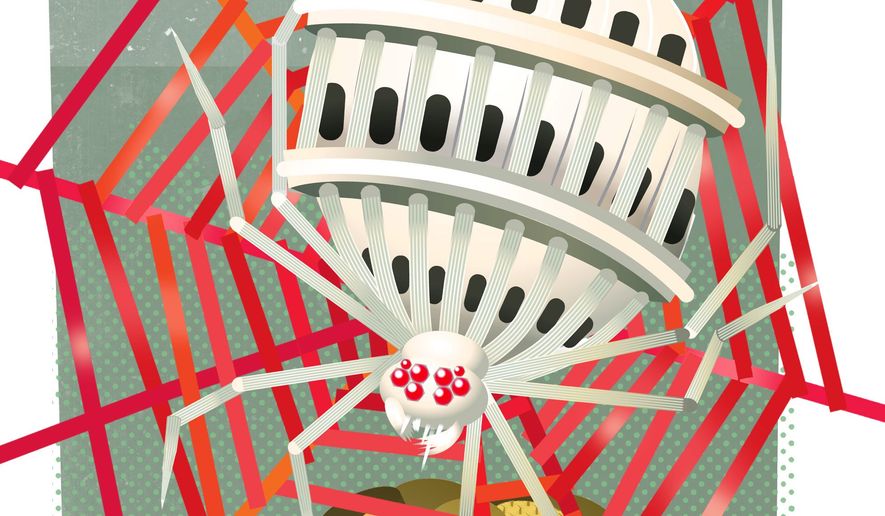OPINION:
LAS VEGAS | For the past decade, a strange migration of a couple of thousand people from all over the world to Las Vegas takes place — in the middle of July. They come — at least most — not to gamble and certainly not for the weather where the normal daytime temperature is a 100-plus degrees, but to participate in an event called FreedomFest. This confab has been created and organized by economist Mark Skousen, with the goal of bringing together people who believe in free markets and limited government.
Most of the folks attending define themselves as libertarians, which can mean anything from Republicans who want somewhat lower government spending, taxation and regulation, to those who want almost no government. Many of the participants are well known, such as publisher and former presidential candidate Steve Forbes, libertarian TV journalists John Stossel and Kennedy, financial guru Jim Rogers and others. But also in attendance is a cross section of both young and old who are concerned about protecting themselves financially and the loss of their personal liberty.
Almost all would also claim to be capitalists, meaning they believe in private ownership, rule of law, free markets, free trade, and limited government intervention in their economic lives. Calling someone a capitalist is a pejorative term in many media and left-leaning political circles. Mr. Forbes saw it as a market opportunity — when a number of competing business magazines seemed to almost be embarrassed in having to defend capitalism — so Forbes magazine proudly refers to itself as a “capitalist tool.”
The opponents of capitalism have succeeded in clouding the minds of many, by failing to distinguish between free-market capitalism and crony capitalism. Crony capitalism exists when politicians and government bureaucrats collude with business people to restrict competition and obtain monopoly advantages. Examples abound with everything from sole source government contracts and special tax treatments to restricting the number of taxicabs through the sale of “medallions.”
The various government restrictions raise prices for consumers and discourage innovation. State and local government officials collude with industry groups to require expensive training for hairdressers, flower arrangers and interior decorators — all in attempts to restrict entry by new potential competitors. Just look at the number of governments that against the desires of their own citizens are trying to prohibit Uber and Lyft from operating, because the politicians are under the control of the taxicab operators and the taxicab unions. It’s pure and simple crony capitalism, aka corruption.
The federal government created Fannie Mae and Freddie Mac as private companies to buy mortgages from banks, with the goal of increasing mortgage availability for the middle class. These organizations soon became corrupted and drove much of their competition out of business because they were able to offer lower interest rates due to their “implicit” government guarantee. Members of their boards were appointed by people in government rather than only by their private stockholders. Millions of campaign donations were given by Fannie and Freddie to maintain their privileged status. When they predictably collapsed, the taxpayers were left with the bill, but the corrupt and incompetent managers and the politicians who benefited walked away. Congress, rather than using the bankruptcy laws as a reason to abolish Fannie and Freddie, instead renewed them — so the same play can happen again.
When President Trump and others talk about the “swamp” of Washington, much of what they are referring to is crony capitalism. From the time of organized governments, rulers found it useful to make special deals with merchants. The father of modern economics, Adam Smith, in his great classic, “Wealth of Nations” published in 1776, had many warnings about the dangers of business people colluding among themselves or with government officials against the interests of the people. This was long before Karl Marx labeled the naturally evolved private economic system as “capitalism.”
What is often overlooked is that Smith had a great influence on the American Founding Fathers. They had read his book. Benjamin Franklin was a personal friend of Smith. Smith’s descriptions of how those in business and government collude reinforced the Founders’ belief that a system of limited government with many checks and balances was the best hope to limit corruption (crony capitalism) and ensure liberty.
A government that spends trillions of dollars and controls the fate of tens of millions of businesses and individuals through regulation is nothing more than a gigantic honey pot for those who seek to gain without engaging in productive activity.
President Trump has been explicit about understanding at least part of the problem. Yet, he has given little indication that he understands the true depth of the problem. Even his limited attempts to rein in government have caused his opponents to fear that he will take away their honey pot, which, in part, explains their vicious attempts to get rid of him.
• Richard W. Rahn is chairman of Improbable Success Productions and on the board of the American Council for Capital Formation.




Please read our comment policy before commenting.